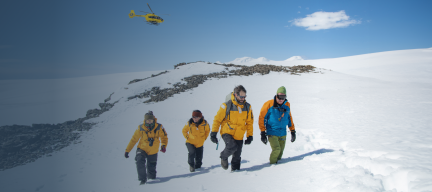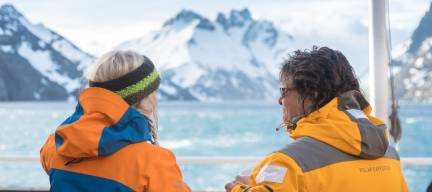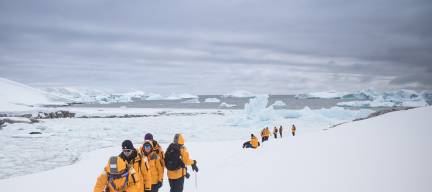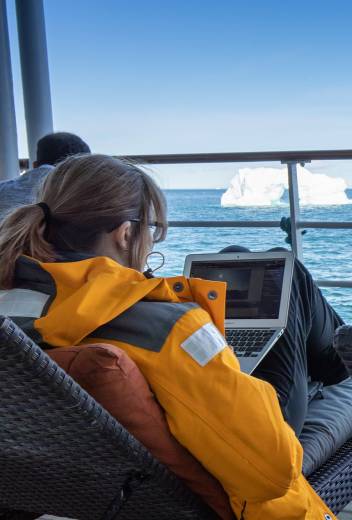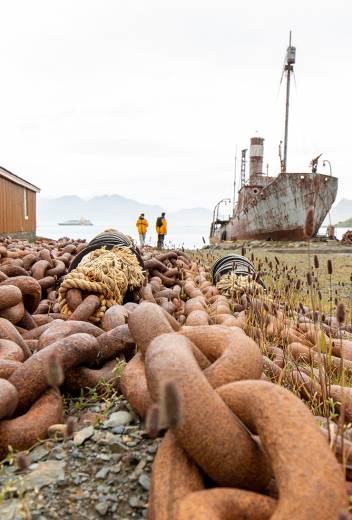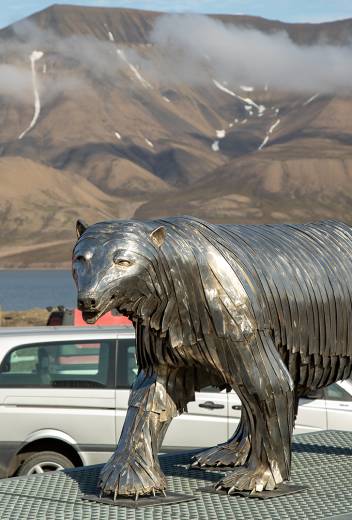You’ve been planning your perfect Arctic expedition and are ready to go! Well, almost… you might still have a few lingering questions, like:
Do I need a visa for any of the countries we’re traveling in?
What languages are spoken where we’re going?
Should I bring a specific type of currency, and are there opportunities to exchange currency in the course of our expedition?

A Quark passenger looks over the town of Pangnirtung on Baffin Island. Photo: Acacia Johnson
These types of practical questions are common as Arctic passengers prepare for their expedition. In this post, you’ll learn about the currencies, languages and entry requirements of the countries you might visit or pass through en route to your Arctic expedition.
Currencies in Arctic and Gateway Countries
Canada: The official currency of Canada is the Canadian dollar. You can exchange currency at the Ottawa airport. The U.S. dollar is accepted by many retailers in southern Canadian cities, but many accept it on par with the Canadian dollar and give change as such. Major credit and debit cards are almost universally in the country’s south, but you should bring cash when traveling in the far north.
Denmark & Greenland: The Danish krone is the common currency of Denmark and Greenland. There are banks in many communities and it is possible to change money at some hotels. Often, you can withdraw krone from ATMs using credits cards, though these are not common in small Greenland villages.

A quick reference guide to the currencies you’ll want to carry on your Arctic expedition.
Finland: The currency of Finland is the Euro. Banks are open on weekdays only, but there are ATMs in most places, with instructions in Finnish and English. Major credit cards are commonly accepted.
Iceland: The official currency of Iceland is króna and Visa and Mastercard are accepted throughout the country. All major currencies can be exchanged at the airports, banks and currency exchanges when you arrive.
Norway/Spitsbergen: The Norwegian currency is the Kroner, but virtually everyone in the country uses debit/credit cards. Post offices and some supermarkets don’t accept foreign credit cards, though they do accept debit cards. Visa and Mastercard are the most commonly accepted credit cards. If you want to exchange cash, Forex, the Norwegian bank will provide the service.
Russia: The Russian currency is the Ruble. Neither the US dollar nor the Euro are accepted as legal tender. In Russia, cash is used more often for transactions than credits cards and you’ll find there are many places to exchange currency, but you’ll get better rates in major cities. If you take traveller’s cheques, the only place to cash them is in a bank, and they can’t be used as cash. ATMs are common in the larger cities, if you prefer to withdraw cash this way.
Sweden: Has its own currency, the Swedish Kronor. The majority of businesses in Sweden only accept this currency (no foreign dollars) but bank and credit cards are accepted virtually everywhere. There are exchange offices and you can withdraw local currency from an ATM.
Get your Arctic Expedition brochures
Most Common Languages in Arctic & Gateway Countries
Canada: The province of Ontario, where Ottawa is located, is incredibly multinational and diverse; over 200 languages are spoken there. Most residents speak one of Canada’s two official languages, French or English, and many in Ottawa are fluent in both.

An Inuit elder and a community member on Baffin Island, Canada. Photo: Nunavut Tourism
Denmark & Greenland: The Greenlandic language, belonging to the Eskimo family of languages, is spoken by about 57,000 residents. You can learn a few key phrases to help open up communications on the Greenland tourism website. In school, residents learn West Greenlandic, Danish and English.
Finland: Bilingual between Finnish and Swedish. In larger cities like Helsinki, many also speak English.
Iceland: The written and spoken language in Iceland is Icelandic, an Old Norse language that has changed little in the past thousand years. English and Danish are mandatory subjects in Icelandic schools and many Icelanders are multilingual.
Norway/Spitsbergen: Norwegian, a North Germanic language, is the official and most prevalent language in Norway, although the majority of residents also speak English.
Russia: Some expeditions sail out of the port city of Murmansk, Russia. There’s no academic requirement for Russians to learn English, so it may be helpful to learn a few conversational Russian phrases before you go. Many people in the tourist-oriented areas and service industries can speak and understand English.

After a charter flight from Helsinki, Finland, passengers depart Murmansk, Russia, for the North Pole aboard 50 Years of Victory, the world’s most powerful nuclear icebreaker.
Sweden: If you’re traveling through Sweden, you’ll find that about 90% of the population speak English, Swedish is the majority language, and Finnish is the largest minority language.
Find YOUR Ideal Arctic Expedition
Entry Requirements & Visas for Arctic & Gateway Countries
Different countries have different entry requirements, based on the visitor’s country of residence or citizenship. We recommend that you contact the Consulate or Embassy of each country on your expedition itinerary for the most up-to-date information on their visa requirements. It can take up to six weeks for visa documents to be processed, so plan to do this several months before your departure.

A couple enjoy the view from the shores of a Greenland fjord. Photo: Greenland.com
All passengers are required to travel on a passport that is valid for at least six months after your expedition.
Read on to learn more about traveling in specific Arctic countries, and always confirm the information with the travel authority of the country you plan to visit. While we have done our best to ensure this is current at the time of publication, entry and visa requirements can change at any time.
Canada: Visa-exempt foreign nationals must have an Electronic Travel Authorization to fly to or travel through Canada. The cost is $7.00 Canadian. U.S. citizens and travelers with a valid Canadian visa are exempt. Prior to touching down in Canada, flight staff will give you a Declaration Card which you’ll be asked to present at the first Canada Border Services Agency (CBSA) checkpoint. Once directed to a booth, you may be asked about your visit, what goods you are bringing into the country with you, and whether you have duty-free items. After retrieving your luggage, you’ll head to a second CBSA checkpoint to hand in your Declaration Card. You may be asked to present your luggage for inspection.
Denmark & Greenland: Residents of certain countries require a visa to visit Denmark and Greenland–you can find the application information here. It’s important to note that if you are visiting Greenland, it must be noted when you apply for the Danish visa. The visa is usually obtained from the embassy or consulate in the country in which the application is submitted. Unless you’re travelling from a Schengen country, you’ll have to pass through immigration and customs. Customs officials may ask to see you return ticket, or proof of sufficient funds for your stay.
Finland: Travellers from outside of the Schengen countries are subject to routine immigration checks and selective customs checks. A visa is not required for most EU residents and those from many other countries. If you don’t require a visa, you can stay in Finland for up to 90 days. Visitors from some countries do require a visa to enter Finland.
Iceland: Another Schengen area country, Iceland doesn’t require a visa from EU citizens, just a valid passport. Canadian, American and Australian travelers don’t require a visa, but they do require a valid passport issued within 10 years, and a return ticket. The Icelandic Directorate of Immigration has a complete listing of up to date visa and passport information.
Norway/Spitsbergen: The Svalbard region consists of nine major islands (and many smaller ones) between Norway and the North Pole. Norway itself is a Schengen country, so the same visa rules as Iceland, Finland and Denmark apply. Although Svalbard is a Norwegian territory, it was excluded from the Schengen agreement and therefore you will need a valid passport to travel in the area. EU residents require a valid passport, and can stay in the country for up to 90 days. Canadian and American citizens require a valid passport, but no visa; Norway has published a Schengen Fact Sheet which gives further details and also has a country specific information page.
Russia: Most often, traveling with Quark means your expedition will begin in Helsinki and you’ll arrive in Murmansk on a charter flight. You may be asked to fill in a migration card; keep your stamped declaration form until you leave the country if you are taking the items you declared home. Residents of many western countries require a valid passport and a visa issued by the Russian Embassy in order to visit Russia. There are different types of Russian visas; check with your country’s Russian embassy to determine which visa you need well in advance of your expedition.
Sweden: Sweden is another country within the Schengen region. EU residents require a valid passport and can stay in the country for up to 90 days. Currently, Canadian and American citizens require a valid passport, but no visa; further information is available from the Swedish Migration Agency.
Important! Double-Check Your Travel Documents & Medications
You are responsible for fulfilling all necessary passport and visa requirements prior to your expedition departure.
Is there anything worse than the panic of a passport issue or forgotten passport? Maybe just one thing – lost or forgotten medication.
The next time you renew your prescription pre-trip, save the empty bottle so you have two containers with your prescription information on them for travel. Split your prescription(s) between your carry-on and checked baggage.
Want to learn more about planning your own epic journey to the Arctic?
- Read more Arctic adventure stories from expedition experts and travelers like you
- See a variety of Arctic expedition brochures and download yours free

